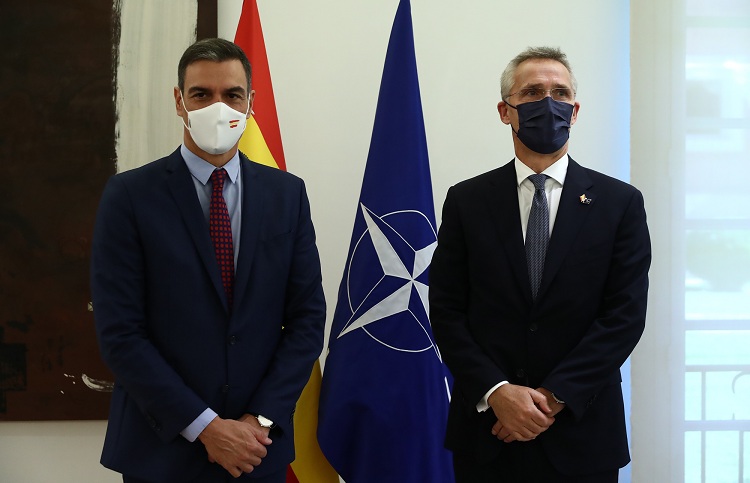Eduardo González
The Heads of State and Government of the 30 NATO member states, including the President of the United States, Joe Biden, are participating today in Brussels in an extraordinary NATO Summit in which they will support the increase of military aid to Ukraine and will address, among other issues, the increase of the defense budgets of the member states.
Biden’s presence in Brussels is the third trip of the American president to Europe since he took office and the first since the Russian invasion of Ukraine began, exactly one month ago today. The President of the Government, Pedro Sánchez, will also participate in the Extraordinary Summit, but, according to Moncloa sources, no official bilateral meeting with Joe Biden is foreseen, despite the fact that Spain will host the next NATO Summit, to be held in Madrid at the end of June.
During the extraordinary Summit, according to the invitation letter sent by NATO Secretary General Jens Stoltenberg, four main topics will be addressed: the reinforcement of deterrence and defense capabilities, military support to Ukraine, political support to other countries in the area and the role of China in this conflict.
Regarding the first topic, Stoltenberg’s aim is to gather proposals from the partners on the next security steps following Russia’s invasion of Ukraine, especially in view of the Madrid Summit. This includes a discussion on strengthening deterrence and defense in the short, medium and long term, especially on the eastern flank. In this regard, the Secretary General announced yesterday at a press conference that the allies will approve the deployment of four new combat battalions in Slovakia, Hungary, Romania and Bulgaria. For its part, according to the aforementioned Moncloa sources, Spain will insist on the need to reinforce also the southern flank, especially the Sahel, where Russia has more and more influence and presence.
Apart from that, the secretary general will ask for a debate on the increase of the defense spending of the allies and even of the common financing of NATO. “Major reinforcements of our security will require major investments in defense,” Stoltenberg declared yesterday. “So I hope allies will agree to redouble their efforts to invest more,” he added. The meeting comes almost two weeks after Pedro Sánchez announced the government’s intention to increase defense spending to 2% of GDP, an announcement that generated the rejection of Unidas Podemos (PSOE’s partner in the coalition government) and most of its parliamentary supporters.
The same sources indicated that it is very difficult for Spain to advance beyond 1.22% in 2024 and recalled, in this regard, that the 2% target is part of the so-called Wales Commitment, approved at the NATO Summit in 2014 and in which States were urged to “advance” (not “reach”) towards 2% in a period of ten years. In fact, although some countries have already reached that goal, others have already announced that they will not achieve it before 2033, although the war in Ukraine has activated the debate and it is very likely that Stoltenberg himself will ask at the Madrid Summit the States to clarify their timetables to move towards 2%.
In any case, the aforementioned Moncloa sources recalled that the Wales Commitment includes two other “legs” apart from the 2% target: that at least 20% of defense spending be devoted to the modernization of the armed forces, a target that Spain has already surpassed, and that the States participate equally in the Alliance’s missions. Spain participates in all NATO missions except Kosovo.
Military aid to Ukraine and China’s role
The second major objective of the extraordinary summit is to increase military support to Ukraine, taking into account that NATO will not enter the conflict directly (including the rejection of the no-fly zone and the NATO peacekeeping mission proposed by Poland). In Brussels, Stoltenberg is to make a renewed call for increased military support and just yesterday announced cybersecurity assistance and the dispatch of equipment to help Kiev “protect itself against chemical, biological, radiological and nuclear threats.”
In addition, NATO leaders will discuss political and practical support for the partners most affected by the Ukrainian invasion because of their fragility and vulnerability, notably Georgia, Moldova and Bosnia and Herzegovina. They will also analyze the relationship with China and the role that this country, a global player with a clear hegemonic ambition, can play both in the Ukrainian crisis and in the global geopolitical scenario that will be defined in the strategic concept to be approved at the Madrid Summit. According to Stoltenber, the allies will call on China to “fulfill its responsibilities as a member of the UN Security Council, to refrain from supporting Russia’s war effort and to join the rest of the world in calling for an immediate end to the conflict.”





